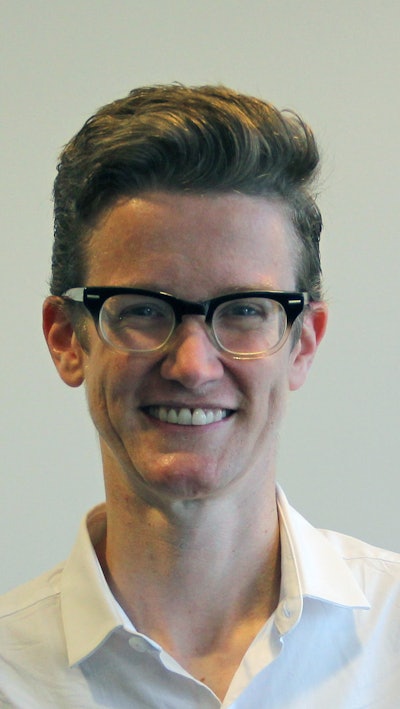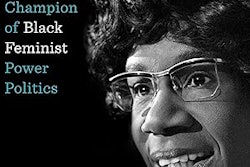 Dr. Ricky Hill
Dr. Ricky Hill
The decision, if rendered as based on the opinion, threatens to overturn protections for women’s rights established by Roe v. Wade, which protected a woman’s right to privacy such as in the case of abortion. Twenty-six states are poised to immediately ban abortions, without exception or consideration of medical necessity in most cases, if such a ruling is upheld.
Scholars around the country have expressed outrage online — as well as their concerns about the domino effect the ruling could have on other issues in gender and sexuality.
“The implications of this potential ruling will be far more sweeping than I think many of us can even begin to realize,” says Dr. Ricky Hill, a research assistant professor at the Institute for Sexual and Gender Minority Health and Wellbeing at Northwestern University’s Feinberg School of Medicine, in a statement posted to the school’s website. “The cries of ‘states’ rights!’ are ready to encompass everything from birth control to gender-affirming care to marriage equality to who knows what else. Abortion is just one focused attack on bodily autonomy, and I anticipate that this is only the beginning of a backsliding of rights for a lot of marginalized individuals.”
Dr. Katherine Sender, professor of communication and feminist, gender, and sexuality studies at Cornell University, says via her institution’s blog that she sees “a direct link between the possible overturning of Roe v. Wade and the risk of push back on LGBTQ civil rights.”
“We are already seeing parallel conservatism with Florida’s ‘Don’t Say Gay’ bill. But the Roe v. Wade issue is a little different because it puts in question the right to privacy that also underlies the overturning of anti-sodomy laws, and thus marriage equality,” she says.
A threat to recruitment
In 2021, Texas legislators passed what was at the time the most restrictive ban on abortion in the nation through the so-called Heartbeat Bill, or SB 8, effectively banning abortions after around six weeks of pregnancy. In May, Oklahoma passed HB 4327, to be considered the most restrictive. The states preview a post-Roe world, and many women and birth-giving people across the country are concerned about what the legislation could mean for their ability to access healthcare, even in cases where it might be lifesaving.
Dr. Lisa L. Moore, the Archibald A. Hill Regents Professor in American and English Literature and Director of the LGBTQ Studies Program at the University of Texas at Austin, says she has already seen recruiting take a hit because of the legislation.
“We have already had people who have been admitted to our graduate programs — so these are people in their 20s who are anticipating they may need access to reproductive healthcare — turn us down even though we’re a top-ranked program [in English],” says Moore. “We’re involved in a faculty hire right now too where that has come up. I think it’s been difficult now for awhile, but if there is this open and shut access to reproductive healthcare, I think that’ll be just a hard no from a lot of people” who might have otherwise chosen to work or study at the university.
Moore, like others, worries the originalist view of the Constitution “could undermine a lot of other civil rights going all the way back to Brown v. Board of Education,” she says.
“I can’t predict the future, but I’m very concerned,” she adds, saying “it could not be more clear that it’s really just about control and subjugation.”
Future of campus health centers in flux
The Dobbs ruling is the latest in a swing of political attacks on women, trans children, and the LGBTQ community at-large, scholars say. But there are real concerns about how the ruling could impact inclusion efforts on campus.
Dr. Gillian Frank is an historian of religion and sexuality who has been affiliated with the University of Texas at Austin, Princeton, and the University of Virginia. Frank says he is concerned about what will happen when people are forced to carry unwanted pregnancies to term — how will it impact students’ abilities to persist? And are universities prepared to support those students; there is a crisis of universities overall ill-equipped to support student parents.
He points out that higher education as a whole still has not figured out how to address sexual violence, which he says “is rampant on college campuses” and could in the worst cases result in pregnancy.
And what about reporting requirements if the right to privacy precedent falls?
“I am not sure what sort of reporting university health centers will be forced to do,” says Frank. “I don’t know what sort of medical advice they’ll be able to dispense. I’m not sure how they’ll be able to support students who want to terminate pregnancies or who want counseling to determine what the options are. In the past, health centers on college campuses became incredibly fraught places for women who were carrying unwanted pregnancies."
Frank says more restrictive abortion laws may mean the government will be tracking more sources of data about students seeking abortion care, complicating the work of medical resource sites like campus health centers. “Whether they’re going to be able to retain and protect student privacy is going to be interesting,” he says.
Waiting for final word
Frank says it is important to remember the leaked draft isn’t the final decision, but like Moore, he cautions that if Roe falls, it’s not just gender rights that are on the table.
Loving v. Virginia, which set the stage for interracial marriage, is also on the line along with Obergefell v. Hodges, which allowed for same-sex marriage, and Lawrence v. Texas, which decriminalized sodomy.
“All of them basically use [the] 14th Amendment but effectively derive from this idea of privacy that may not be articulated explicitly in the Constitution but” is implied, Frank says. “If Roe falls on the argument that there’s no such thing — that the Constitution doesn’t specifically enumerate an expectation of privacy … a whole host of other sexual rights, scholars fear, are up for grabs because of the way this has struck at the heart of sexual privacy and bodily autonomy.”
And that means universities will likely continue to be impacted, according to Moore. She worries the fallout from the ruling and related legislative moves in states will ultimately impact the mission of the university.
“The University of Texas is charged by its charter by the legislature to be a university of the first class, but if we can’t get first class people here because we are practicing discrimination against … people who want to have access to reproductive care or trans-affirming care … we’re not going to be first class, are we,” says Moore.


















